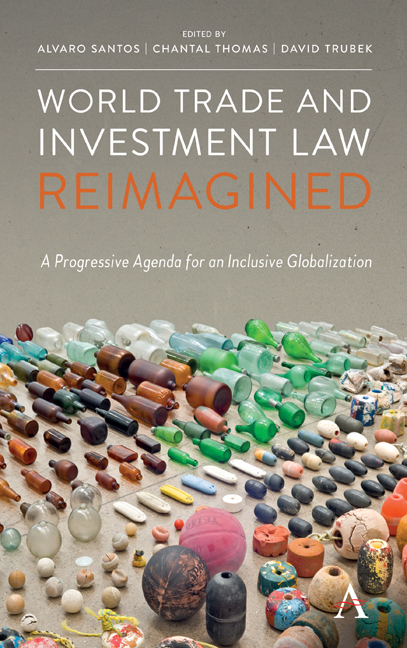Book contents
- Frontmatter
- Contents
- Acknowledgments
- List of Contributors
- Introduction World Trade and Investment Law in a Time of Crisis: Distribution, Development and Social Protection
- PART I RETHINKING THE POLITICAL ECONOMY OF TRADE: COMMENTS ON DANI RODRIK'S STRAIGHT TALK ON TRADE
- PART II SETTING THE STAGE FOR A PROGRESSIVE VISION: EMERGING ISSUES IN WORLD TRADE AND INVESTMENT LAW
- SECTION 1 MAPPING THE NEW CONTEXT FOR TRADE AND INVESTMENT LAW
- SECTION 2 DEALING WITH MAJOR CHANGES IN THE WORLD ECONOMY
- SECTION 3 FRAMING A MORE EQUITABLE INVESTMENT LAW REGIME
- Chapter Fourteen Bilateral Investment Treaties: Has South Africa Chartered a New Course?
- Chapter Fifteen Rethinking the Right to Regulate in Investment Agreements: Reflections from the South African and Brazilian Experiences 163
- Chapter Sixteen Making Local Communities Visible: A Way to Prevent the Potentially Tragic Consequences of Foreign Investment? 171
- SECTION 4 SUPPORTING DEVELOPMENT
- SECTION 5 REINFORCING SOCIAL PROTECTION: SPREADING THE BENEFITS OF TRADE, DEALING WITH LOSSES AND EXPLORING THE TRADE–IMMIGRATION NEXUS
- Index
Chapter Sixteen - Making Local Communities Visible: A Way to Prevent the Potentially Tragic Consequences of Foreign Investment? 171
from SECTION 3 - FRAMING A MORE EQUITABLE INVESTMENT LAW REGIME
Published online by Cambridge University Press: 07 September 2019
- Frontmatter
- Contents
- Acknowledgments
- List of Contributors
- Introduction World Trade and Investment Law in a Time of Crisis: Distribution, Development and Social Protection
- PART I RETHINKING THE POLITICAL ECONOMY OF TRADE: COMMENTS ON DANI RODRIK'S STRAIGHT TALK ON TRADE
- PART II SETTING THE STAGE FOR A PROGRESSIVE VISION: EMERGING ISSUES IN WORLD TRADE AND INVESTMENT LAW
- SECTION 1 MAPPING THE NEW CONTEXT FOR TRADE AND INVESTMENT LAW
- SECTION 2 DEALING WITH MAJOR CHANGES IN THE WORLD ECONOMY
- SECTION 3 FRAMING A MORE EQUITABLE INVESTMENT LAW REGIME
- Chapter Fourteen Bilateral Investment Treaties: Has South Africa Chartered a New Course?
- Chapter Fifteen Rethinking the Right to Regulate in Investment Agreements: Reflections from the South African and Brazilian Experiences 163
- Chapter Sixteen Making Local Communities Visible: A Way to Prevent the Potentially Tragic Consequences of Foreign Investment? 171
- SECTION 4 SUPPORTING DEVELOPMENT
- SECTION 5 REINFORCING SOCIAL PROTECTION: SPREADING THE BENEFITS OF TRADE, DEALING WITH LOSSES AND EXPLORING THE TRADE–IMMIGRATION NEXUS
- Index
Summary
For decades, international investment law has focused on investor-state dispute settlement (ISDS). The academic and policy debate has polarized into two competing camps arguing in favor and against this dispute settlement mechanism. A fundamental issue is whether ISDS can be consistent with an appropriate interpretation of states’ right to regulate. There is nothing surprising in this debate. The private vs. public or international vs. domestic tensions are recurrent topics nowadays. What is surprising, however, is how both promoters and critics of ISDS have managed to narrow down the complex and multifaceted field of foreign investment governance to ISDS and how investment tribunals resolve certain high-profile cases, such as the famous tobacco saga. This limited view does not acknowledge the complexity of foreign investment relations and how the benefits, costs and risks of large investment projects are allocated. Also, international investment law makes some interests and their actors less visible— or even invisible— potentially reducing their benefits and increasing their costs and risks. The most paradigmatic case is that of local communities.
The literature on international investment law and policy has consistently avoided the role and interests of local communities. This is especially troublesome in natural resource and infrastructure projects, as local communities live near these projects and are often the most affected. Experience shows that foreign investment in natural resources can lead to overexploitation, environmental harm and, just as important, social conflict. However, there is little evidence that host states will necessarily use their regulatory powers to promote and protect local communities. Host states play an ambivalent role, facilitating foreign investment first and responding to local demands only when resistance escalates to unacceptable levels, such as in the case of Cochabamba, Bolivia (Aguas del Tunari v. Bolivia), which illustrates the potentially tragic consequences of a foreign investment and how difficult it is for local communities to find relief in either domestic or international jurisdictions.
This essay explores how the international investment regime makes things more difficult for local communities. This regime is not the sole reason for their problems, but it does deteriorate their situation vis-à-vis foreign investors and states. The good news is that there is no rationale for a narrow international investment regime. The crisis of ISDS can be an opportunity to move from foreign investment dispute settlement to foreign investment governance, ensuring local participation before, during and after the investment.
- Type
- Chapter
- Information
- World Trade and Investment Law ReimaginedA Progressive Agenda for an Inclusive Globalization, pp. 171 - 180Publisher: Anthem PressPrint publication year: 2019

